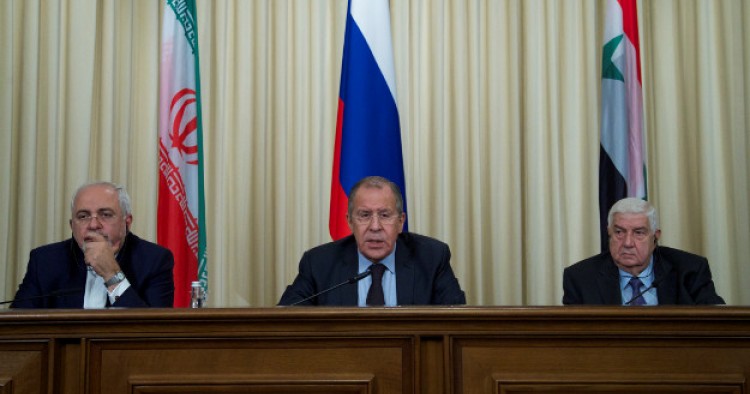Sergey Vershinin, the head of the Russian Foreign Ministry’s Middle East and North Africa department, will meet with Iranian Deputy Foreign Minister Hossein Jaberi Ansari to discuss the U.N.-sponsored peace talks on Syria, the Iranian media reports. Vershinin represents Moscow in the Geneva talks and participated in the Syria talks in Kazakhstan last month as well. The Iranian Students News Agency (ISNA) also quotes Russian media sources as saying that Russian Deputy Foreign Minister Gennady Gatilov is also scheduled to meet with representatives of the Syrian government and Syrian opposition groups this week.
Comment: The meeting between Russian and Iranian diplomats comes at a critical time. Bloomberg News reported earlier today that Moscow is “struggling to salvage its bid to secure a deal” at the Geneva talks “as deepening differences with Iran risk a repeat of previous failed peace efforts led by the U.S.” The report also quoted Russian President Vladimir Putin as telling reporters in Kyrgyzstan today that “things aren’t going as smoothly as we would want” in the Syria talks.
Meanwhile, Syrian opposition groups attending the talks are alleging that Tehran and Damascus are violating the fragile ceasefire on the ground. “Iran never wants any solution in Syria, the way they act on the ground shows that they want this war to continue,” the chief spokesman of the Western-backed High Negotiations Committee, Salem al-Muslet, said in an interview in Geneva. “Hopefully, the Russians will understand that there is a partner that does not want any political transition and they will put pressure on the regime to start the negotiations,” he added.
Iran, which has deployed its elite Islamic Revolution Guards Corps (I.R.G.C.) forces to Syria and commands tens of thousands of Shiite militiamen in the Syrian battlefield, has constantly played a spoiler role since the Russia-sponsored Syria peace talks began in Kazakhstan last month. While Iran agreed with Russia and Turkey on January 24 to establish a trilateral mechanism to enforce the fragile cessation of hostilities in Syria, rebel groups in Syria have repeatedly accused Iran-backed forces of violating the ceasefire agreement. Moreover, although the joint statement at the Astana talks urged “all members of the international community to support the political process,” Iran opposed the inclusion of the United States and key regional players in the process.
Tehran’s goals in Syria are even not entirely in line with those of its close ally Russia. Moscow, for example, appears willing to support the transfer of power from President Bashar al-Assad as part of a transition process, but Iranian leaders see any attempt to remove Assad as a red line. Indeed, as soon as the Astana talks concluded, Ali Akbar Velyati, a senior aide to Supreme Leader Ali Khamenei, said that the Syria meeting affirmed Assad’s legitimacy. “The Astana meeting demonstrated that all parties, either Turkey or the groups following it, and even countries not present there (in the talks) have somehow recognized the Syrian government’s legitimacy, directly and indirectly,” he said. And as Ankara and Moscow were preparing for the Astana meeting, Iranian leaders were urging Damascus to continue military operations. “Syria’s enemies must not be allowed to tactically exploit the opportunity of ceasefire and political talks to reinforce, rearm and fund terrorist groups and rebuild their operational capabilities,” Ali Shamkhani, a top advisor to Supreme Leader Ali Khamenei, told visiting Syrian Prime Minister Imad Khamis in Tehran.
The Middle East Institute (MEI) is an independent, non-partisan, non-for-profit, educational organization. It does not engage in advocacy and its scholars’ opinions are their own. MEI welcomes financial donations, but retains sole editorial control over its work and its publications reflect only the authors’ views. For a listing of MEI donors, please click here.













